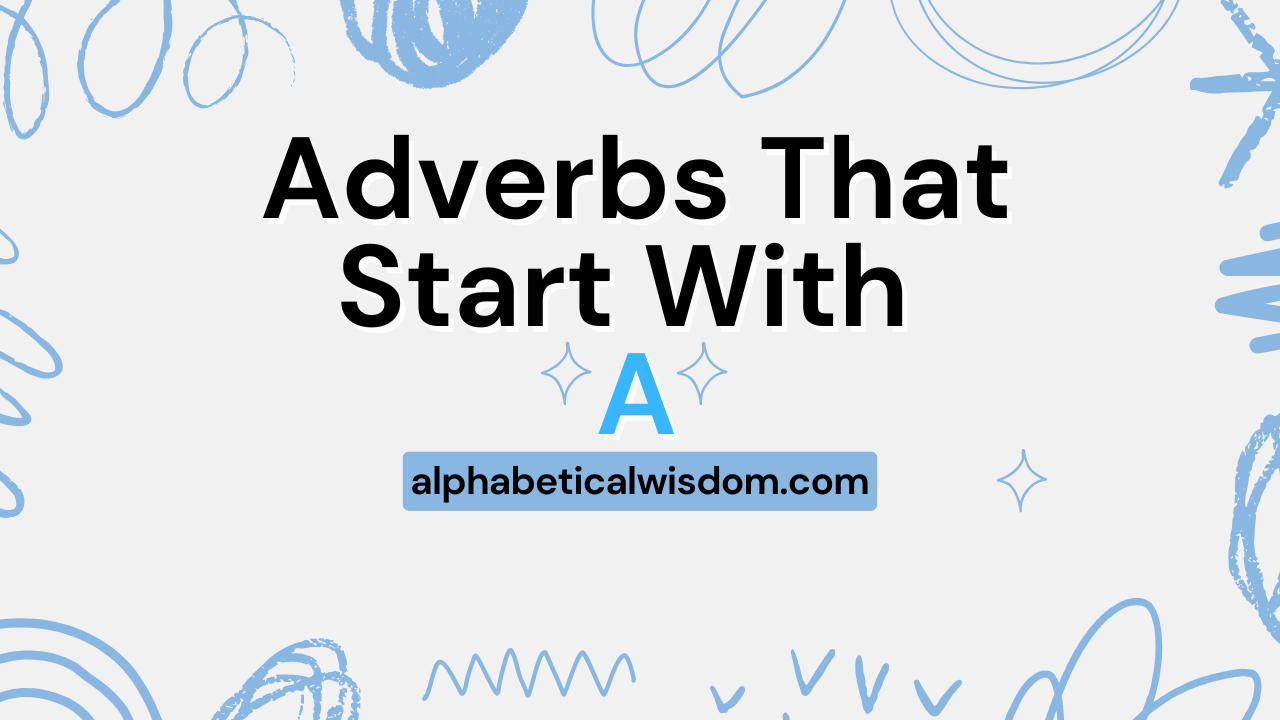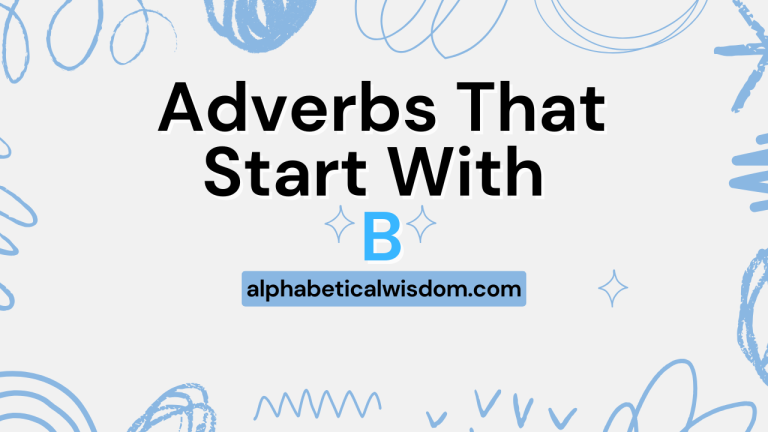Adverbs That Start With A: A Comprehensive Guide
Adverbs are essential components of the English language, enriching sentences by providing details about actions, qualities, or other adverbs. Understanding adverbs, particularly those starting with ‘A,’ enhances both writing and speaking skills, allowing for more precise and descriptive communication.
This guide is designed for English language learners, writers, and anyone looking to refine their grasp of English grammar. By exploring the nuances of ‘A’ adverbs, you’ll gain the ability to add depth and clarity to your expressions, making your language more vivid and impactful.
Table of Contents
- Introduction
- Definition of Adverbs
- Function of Adverbs
- Structural Breakdown
- Types of Adverbs Starting With ‘A’
- Examples of Adverbs Starting With ‘A’
- Usage Rules
- Common Mistakes
- Practice Exercises
- Advanced Topics
- FAQ
- Conclusion
Definition of Adverbs
An adverb is a word that modifies a verb, an adjective, another adverb, a phrase, or a clause. Adverbs provide additional information about how, when, where, why, to what extent, or under what conditions something happens.
They add detail and nuance to sentences, making them more informative and engaging. Understanding adverbs is crucial for effective communication, as they help to convey precise meanings and create vivid descriptions.
Adverbs can be single words (e.g., always, angrily), phrases (e.g., in a hurry), or clauses (e.g., when the sun sets). They play a vital role in sentence structure and can significantly alter the meaning of a statement. For instance, consider the difference between “He spoke” and “He spoke angrily.” The adverb angrily adds a layer of emotional context, transforming a simple statement into a more descriptive one.
Function of Adverbs
The primary function of an adverb is to modify other words or phrases within a sentence. This modification can take several forms, depending on the type of adverb and the context in which it is used.
Adverbs can describe the manner in which an action is performed, the time or place of an event, the degree to which something is true, or the frequency with which something occurs. They can also indicate the purpose or reason behind an action.
This versatility makes adverbs indispensable for creating detailed and nuanced expressions.
For example, adverbs of manner describe how something is done (e.g., He ran quickly). Adverbs of time specify when something happens (e.g., She arrived early). Adverbs of place indicate where something occurs (e.g., They played outside). Adverbs of degree express how much or to what extent (e.g., It was extremely hot). Adverbs of frequency describe how often something happens (e.g., I rarely eat fast food). Each type of adverb contributes a unique aspect to the overall meaning of the sentence.
Structural Breakdown
Adverbs can be structurally simple, consisting of a single word, or more complex, involving phrases or clauses. Single-word adverbs are often formed by adding the suffix “-ly” to an adjective (e.g., quick becomes quickly). However, not all adverbs end in “-ly,” and some words that end in “-ly” are actually adjectives (e.g., friendly). Adverb phrases consist of two or more words that function together as an adverb (e.g., in a timely manner). Adverb clauses are dependent clauses that modify a verb, adjective, or adverb in the main clause (e.g., He left after the meeting ended).
The position of an adverb within a sentence can also affect its meaning and emphasis. Adverbs can appear at the beginning, middle, or end of a sentence, depending on the desired effect. For instance, placing an adverb at the beginning of a sentence can draw attention to the adverb itself (e.g., Amazingly, she won the race). Placing it in the middle, near the verb it modifies, is a common and natural construction (e.g., She quickly ran to the store). Placing it at the end can provide a sense of closure or finality (e.g., He finished the project accurately).
Types of Adverbs Starting With ‘A’
Adverbs starting with ‘A’ can be categorized based on their function within a sentence. The most common categories include adverbs of manner, time, place, degree, frequency, and purpose.
Understanding these categories helps to identify and use adverbs effectively.
Adverbs of Manner
Adverbs of manner describe how an action is performed. They often modify verbs and provide details about the way in which something is done. Common adverbs of manner starting with ‘A’ include angrily, awkwardly, and ably.
Adverbs of Time
Adverbs of time indicate when an action takes place. They specify the timing of an event and can refer to specific points in time or durations. Examples of adverbs of time starting with ‘A’ are already, afterwards, and again.
Adverbs of Place
Adverbs of place specify where an action occurs. They provide information about the location or direction of an event. Adverbs of place starting with ‘A’ include abroad, around, and away.
Adverbs of Degree
Adverbs of degree express how much or to what extent something is true. They modify adjectives, adverbs, or verbs to indicate the intensity or degree of a quality or action. Examples of adverbs of degree starting with ‘A’ are almost, absolutely, and awfully.
Adverbs of Frequency
Adverbs of frequency describe how often an action happens. They indicate the regularity or frequency of an event. Adverbs of frequency starting with ‘A’ include always and annually.
Adverbs of Purpose
Adverbs of purpose explain why an action is performed. They indicate the reason or intention behind an event. While less common, adverbs or phrases expressing purpose can start with “A,” such as phrases using “as” to introduce a purpose.
Examples of Adverbs Starting With ‘A’
The following section provides extensive examples of adverbs starting with ‘A,’ categorized by their function. These examples illustrate how adverbs can be used to enhance the clarity and expressiveness of sentences.
Adverbs of Manner Examples
Adverbs of manner describe how an action is performed. They add detail and color to sentences, making them more vivid and engaging.
Consider the following examples:
Here is a table containing 30 examples of adverbs of manner that start with the letter “A”.
| Sentence | Adverb of Manner |
|---|---|
| She sang ably at the concert. | ably |
| He approached the task anxiously. | anxiously |
| The child behaved awfully during the flight. | awfully |
| She answered the question accurately. | accurately |
| The dog barked angrily at the stranger. | angrily |
| He acted absurdly in the play. | absurdly |
| The machine operated automatically. | automatically |
| She walked awkwardly on the uneven path. | awkwardly |
| The project was completed admirably. | admirably |
| He spoke affably to everyone he met. | affably |
| The dancer moved agilely across the stage. | agilely |
| The company adapted ably to the changing market. | ably |
| The team worked assiduously to meet the deadline. | assiduously |
| The lawyer argued astutely in court. | astutely |
| The plan was executed ambitiously. | ambitiously |
| The athlete trained ardently for the competition. | ardently |
| The artist painted abstractly. | abstractly |
| The comedian performed amusingly. | amusingly |
| The student studied attentively in class. | attentively |
| The gardener arranged the flowers artfully. | artfully |
| The musician played the instrument adeptly. | adeptly |
| The chef prepared the meal appetizingly. | appetizingly |
| The debaters presented the case assertively. | assertively |
| She handled the situation adroitly. | adroitly |
| The negotiator acted amicably during the talks. | amicably |
| The speaker addressed the crowd eloquently. | eloquently |
| The climber ascended the mountain audaciously. | audaciously |
| He administered the medicine carefully. | carefully |
| She approached the problem methodically. | methodically |
| The child ate the candy greedily. | greedily |
Adverbs of Time Examples
Adverbs of time specify when an action occurs. They provide context about the timing of events and can refer to specific moments, durations, or frequencies.
Here are some examples:
Here is a table containing 20 examples of adverbs of time that start with the letter “A”.
| Sentence | Adverb of Time |
|---|---|
| I have already finished my homework. | already |
| We will discuss it afterwards. | afterwards |
| He called again to check on the delivery. | again |
| Annually, the company releases its financial report. | annually |
| The team meets after each game to review performance. | after |
| The package arrived ahead of schedule. | ahead |
| They debated the issue at length. | at length |
| The store is open always during the holidays. | always |
| The train arrived on time. | on time |
| We plan to revisit the site at some point. | at some point |
| She decided to act immediately. | immediately |
| The movie will start soon. | soon |
| The problem needs to be addressed urgently. | urgently |
| He will arrive shortly. | shortly |
| We need to leave promptly. | promptly |
| The deadline is approaching rapidly. | rapidly |
| The situation changed suddenly. | suddenly |
| The meeting concluded briefly. | briefly |
| The response was given quickly. | quickly |
| The event occurred recently. | recently |
Adverbs of Place Examples
Adverbs of place indicate where an action occurs. They provide information about the location or direction of an event.
Here are a few examples:
Here is a table containing 25 examples of adverbs of place that start with the letter “A”.
| Sentence | Adverb of Place |
|---|---|
| He decided to live abroad after retiring. | abroad |
| The children were playing around the park. | around |
| She moved away from the city. | away |
| The treasure was hidden above the cave entrance. | above |
| The plane flew across the ocean. | across |
| The cat strolled along the fence. | along |
| The hikers walked ahead on the trail. | ahead |
| The protesters gathered nearby the capitol building. | nearby |
| The refugees sought shelter inside the old church. | inside |
| The lost dog wandered aimlessly. | aimlessly |
| The tourists explored everywhere. | everywhere |
| The soldiers marched forward into battle. | forward |
| The wind blew the leaves outdoors. | outdoors |
| The bird flew over the trees. | over |
| The river flows downstream towards the sea. | downstream |
| The store is located uptown. | uptown |
| The children ran uphill towards the playground. | uphill |
| The workers toiled underground in the mine. | underground |
| The hikers climbed upward towards the summit. | upward |
| The cat jumped through the open window. | through |
| The hikers walked toward the campsite. | toward |
| The dog ran behind the car. | behind |
| The children played outside. | outside |
| The family gathered together for the holidays. | together |
| The travelers ventured inland to explore the country. | inland |
Adverbs of Degree Examples
Adverbs of degree express how much or to what extent something is true. They modify adjectives, adverbs, or verbs to indicate the intensity or degree of a quality or action.
Here are some examples:
Here is a table containing 30 examples of adverbs of degree that start with the letter “A”.
| Sentence | Adverb of Degree |
|---|---|
| I almost missed the train. | almost |
| She is absolutely certain about her decision. | absolutely |
| The weather was awfully cold yesterday. | awfully |
| The team was altogether unprepared for the game. | altogether |
| The project is assuredly going to succeed. | assuredly |
| The singer was amazingly talented. | amazingly |
| He was apparently unaware of the problem. | apparently |
| The task was aggravatingly complex. | aggravatingly |
| The price was appreciably higher than expected. | appreciably |
| The food was agreeably spicy. | agreeably |
| The movie was astonishingly good. | astonishingly |
| She was acutely aware of the situation. | acutely |
| The team was amply rewarded for their efforts. | amply |
| The problem was arguably the most difficult one. | arguably |
| The concert was artistically brilliant. | artistically |
| The experiment was scientifically valuable. | scientifically |
| The results were statistically significant. | statistically |
| The response was politically motivated. | politically |
| The product was commercially successful. | commercially |
| The issue was ethically complex. | ethically |
| He was emotionally drained after the event. | emotionally |
| The decision was financially sound. | financially |
| The strategy was strategically important. | strategically |
| The project was technologically advanced. | technologically |
| The proposal was intellectually stimulating. | intellectually |
| The task was logistically challenging. | logistically |
| The plan was operationally efficient. | operationally |
| The building was architecturally stunning. | architecturally |
| The experience was culturally enriching. | culturally |
| The event was socially significant. | socially |
Adverbs of Frequency Examples
Adverbs of frequency describe how often an action happens. They indicate the regularity or frequency of an event.
Here are some examples:
Here is a table containing 15 examples of adverbs of frequency that start with the letter “A”.
| Sentence | Adverb of Frequency |
|---|---|
| I always brush my teeth before bed. | always |
| The company releases its report annually. | annually |
| We meet at times for a quick chat. | at times |
| The event happens every year. | every year |
| The magazine is published quarterly. | quarterly |
| The team practices daily. | daily |
| The store is open constantly. | constantly |
| The service is available continuously. | continuously |
| The updates occur regularly. | regularly |
| The schedule is followed strictly. | strictly |
| The rules are enforced consistently. | consistently |
| The habit is practiced faithfully. | faithfully |
| The tradition is observed religiously. | religiously |
| The task is performed routinely. | routinely |
| The system is checked periodically. | periodically |
Adverbs of Purpose Examples
Adverbs of purpose explain why an action is performed. They indicate the reason or intention behind an event.
Here are examples using phrases starting with ‘A’:
Here is a table containing 10 examples of adverbs of purpose that start with the letter “A”.
| Sentence | Adverb of Purpose |
|---|---|
| She studied hard as to pass the exam. | as to pass the exam |
| He exercised as to improve his health. | as to improve his health |
| They saved money as to buy a house. | as to buy a house |
| She volunteered as to help the community. | as to help the community |
| He practiced daily as to perfect his skills. | as to perfect his skills |
| They researched thoroughly as to find the best solution. | as to find the best solution |
| She planned carefully as to avoid mistakes. | as to avoid mistakes |
| He trained rigorously as to win the competition. | as to win the competition |
| They collaborated effectively as to achieve their goals. | as to achieve their goals |
| She organized meticulously as to ensure success. | as to ensure success |
Usage Rules
Using adverbs correctly involves understanding their function, placement, and relationship to the words they modify. Here are some key usage rules:
- Placement: Adverbs can appear in various positions within a sentence, but their placement can affect the meaning and emphasis. Adverbs of manner often come after the verb or object. Adverbs of time and place can appear at the beginning or end of a sentence. Adverbs of degree usually precede the word they modify.
- Modification: Ensure that the adverb clearly modifies the intended word or phrase. Misplaced adverbs can lead to ambiguity or unintended meanings.
- Adverb vs. Adjective: Be careful not to use an adjective when an adverb is required, and vice versa. Adjectives modify nouns, while adverbs modify verbs, adjectives, or other adverbs.
- “-ly” Suffix: While many adverbs are formed by adding “-ly” to an adjective, not all adverbs follow this pattern. Some words ending in “-ly” are adjectives, and some adverbs do not end in “-ly.”
Common Mistakes
Several common mistakes can occur when using adverbs. Recognizing and avoiding these errors can significantly improve your writing and speaking skills.
- Misplaced Adverbs: Placing an adverb in the wrong position can change the meaning of the sentence.
- Incorrect: He nearly ate all the cake. (Implies he almost ate it but didn’t)
- Correct: He ate nearly all the cake. (Implies he ate most of it)
- Confusion with Adjectives: Using an adjective instead of an adverb (or vice versa) is a frequent error.
- Incorrect: He sings good.
- Correct: He sings well.
- Double Negatives: Using two negative words in the same clause can create a positive meaning, which is often unintended.
- Incorrect: I don’t have no money.
- Correct: I don’t have any money. or I have no money.
- Incorrect Degree: Using the wrong form of an adverb when making comparisons.
- Incorrect: She runs more faster than him.
- Correct: She runs faster than him.
Practice Exercises
Test your understanding of adverbs with the following exercises. Identify the adverbs in each sentence and classify them by type.
| Question | Answer |
|---|---|
| 1. She sang ably at the concert. Identify the adverb and its type. | Adverb: ably; Type: Manner |
| 2. They will arrive afterwards. Identify the adverb and its type. | Adverb: afterwards; Type: Time |
| 3. He lives abroad now. Identify the adverb and its type. | Adverb: abroad; Type: Place |
| 4. I almost missed the train. Identify the adverb and its type. | Adverb: almost; Type: Degree |
| 5. We always eat breakfast. Identify the adverb and its type. | Adverb: always; Type: Frequency |
| 6. The dog barked angrily at the mailman. Identify the adverb and its type. | Adverb: angrily; Type: Manner |
| 7. The company publishes its report annually. Identify the adverb and its type. | Adverb: annually; Type: Frequency |
| 8. The children were playing around the park. Identify the adverb and its type. | Adverb: around; Type: Place |
| 9. He is absolutely certain about his decision. Identify the adverb and its type. | Adverb: absolutely; Type: Degree |
| 10. She approached the problem anxiously. Identify the adverb and its type. | Adverb: anxiously; Type: Manner |
Exercise 2: Fill in the blanks with an appropriate adverb starting with “A”.
| Question | Answer |
|---|---|
| 1. She finished the race ______. | ably |
| 2. We will discuss the issue ______. | afterwards |
| 3. He is living ______ since he retired. | abroad |
| 4. I ______ forgot my keys this morning. | almost |
| 5. They ______ arrive on time for meetings. | always |
| 6. The protesters gathered ______. | around |
| 7. She ______ aced the test. | assuredly |
| 8. The food was ______ delicious. | absolutely |
| 9. The situation was handled ______. | adroitly |
| 10. The plan was executed ______. | ambitiously |
Exercise 3: Rewrite the following sentences, adding an adverb starting with “A” to enhance the description.
| Question | Answer |
|---|---|
| 1. She sang at the concert. | She sang ably at the concert. |
| 2. They will discuss it later. | They will discuss it afterwards. |
| 3. He lives in Europe. | He lives abroad now. |
| 4. I nearly missed the bus. | I almost missed the bus. |
| 5. We eat breakfast. | We always eat breakfast. |
| 6. The dog barked. | The dog barked angrily. |
| 7. She answered the question. | She answered the question accurately. |
| 8. The machine operates. | The machine operates automatically. |
| 9. The lawyer argued in court. | The lawyer argued astutely in court. |
| 10. The athlete trained for the competition. | The athlete trained ardently for the competition. |
Advanced Topics
For advanced learners, consider these more complex aspects of adverbs:
- Adverbial Clauses: Explore the use of adverbial clauses to add detailed context to sentences. These clauses can express time, place, reason, condition, concession, or manner.
- Conjunct Adverbs: Understand how conjunct adverbs (e.g., however, therefore) connect independent clauses and show relationships between ideas.
- Adverb Placement for Emphasis: Learn how to strategically place adverbs to emphasize specific aspects of a sentence and create a desired effect.
- Distinguishing Between Flat Adverbs and Adjectives: Some words, like “fast” or “early,” can function as both adjectives and adverbs without changing form. Understanding the context is crucial to determine their function.
FAQ
- What is the difference between an adverb and an adjective?
Adjectives modify nouns or pronouns, providing descriptive information about them. Adverbs, on the other hand, modify verbs, adjectives, or other adverbs, providing information about how,
where, when, why, or to what extent something happens.
- Can an adverb modify a whole sentence?
Yes, some adverbs, called sentence adverbs, can modify an entire sentence. These adverbs usually express the speaker’s attitude or opinion about the information being conveyed. Examples include fortunately, obviously, and certainly.
- Where should I place an adverb in a sentence?
The placement of an adverb depends on the type of adverb and the intended emphasis. Adverbs of manner often follow the verb or object, while adverbs of time and place can appear at the beginning or end of the sentence. Adverbs of degree usually precede the word they modify.
- How can I identify an adverb in a sentence?
Look for words that modify verbs, adjectives, or other adverbs. Adverbs often answer questions like “how,” “when,” “where,” “why,” or “to what extent.” Many adverbs end in “-ly,” but not all words ending in “-ly” are adverbs.
- Are there any adverbs that don’t end in “-ly”?
Yes, many adverbs do not end in “-ly.” Common examples include always, never, often, soon, here, there, and well.
Conclusion
Adverbs are vital for adding detail, clarity, and nuance to your language. By understanding the different types of adverbs, their functions, and usage rules, you can significantly enhance your writing and speaking skills.
Focusing on adverbs starting with ‘A’ provides a specific entry point into mastering this essential aspect of English grammar. Continue to practice and explore the diverse world of adverbs to become a more effective and articulate communicator.






